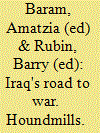|
|
|
Sort Order |
|
|
|
Items / Page
|
|
|
|
|
|
|
| Srl | Item |
| 1 |
ID:
114706


|
|
|
|
|
| Publication |
2012.
|
| Summary/Abstract |
As Iran continues its pursuit of a nuclear capability, outside observers have debated just how worried the world should be. Optimists argue that since nuclear war would be suicidal, no government would ever risk it, and they think the Islamic Republic would be no exception. Pessimists argue that Iran's radical and unstable regime might behave in unpredictable ways and cannot be trusted. Both camps seem to agree that rationality is the key to deterrence; they disagree over whether a nuclear Iran would be rational.
|
|
|
|
|
|
|
|
|
|
|
|
|
|
|
|
| 2 |
ID:
005973


|
|
|
|
|
| Publication |
Houndmills, Macmillan, 1994.
|
| Description |
xv, 304p.
|
| Standard Number |
0333618920
|
|
|
|
|
|
|
|
|
|
|
|
Copies: C:1/I:0,R:0,Q:0
Circulation
| Accession# | Call# | Current Location | Status | Policy | Location |
| 037346 | 320.956/BAR 037346 | Main | On Shelf | General | |
|
|
|
|
| 3 |
ID:
190740


|
|
|
|
|
| Summary/Abstract |
In July 1986, a dramatic top-secret meeting of the Baʿth Pan Arab Leadership, the party’s highest ideological body, fully recorded by Ṣaddām Ḥussein, took place in wartime Baghdad. This meeting is thrice unique. First, the medium, an unabridged, audio-recording. Second, the topic, the dilemma of many Middle Eastern ruling regimes, vacillating between a secular, or semi-secular ideology and Islamic political expediency. In the case of the Baʿth, a more secular and ideological movement than most, this dilemma is particularly poignant. Third, it is exposing a bitter clash between a brutal dictator, who had executed comrades for opposing him, and three brave lieutenants. On the surface it was convened to discuss a tactical alliance with a sworn enemy, the Muslim Brethren (MB). At a dangerous moment in the Iraq-Iran War, Ṣaddām identified swelling popular religiosity. He hoped that an alliance with the MB would blunt criticism of his regime’s secularism. All the same, some participants feared that secular Arabism, the central tenet of Baʿthi faith, was at stake. Unexpectedly, the meeting produced a startling drama. Albeit temporarily, it forced Ṣaddām to take one step back. Other ideologically oriented dictators, such as Vladimir Lenin, Joseph Stalin, Ḥāfiẓ al-Assad, and the Ayatollah Khomeini, too, faced ideology-politics dilemmas, yet none of them left such a surprising chronicle. A similar audio recording also comes to mind that offers a rare verbatim meeting of the inner working of a county’s highest institution at a moment of crisis – the transcripts of Kennedy’s ExComm during the Cuban Missile Crisis. While it deliberated an existential global matter and took place in a democracy, one sees similarities, namely, its detail, the exposure of emotional charges, the ability to speak truth to power, and the benefit resulting from that ability.
|
|
|
|
|
|
|
|
|
|
|
|
|
|
|
|
|
|
|
|
|